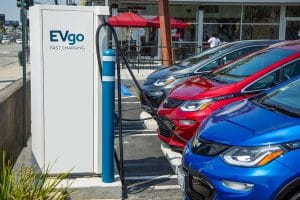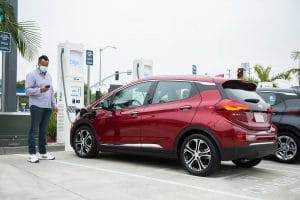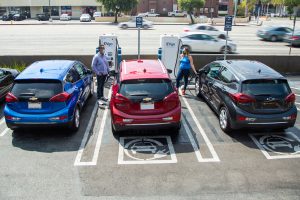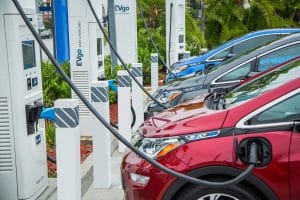
GM and EVgo are partnering to add 2,700 new charging stations to the EVgo’s existing network in the next five years.
General Motors is partnering up with EVGo, the operator of the country’s largest electric vehicle charging network in a push to make it easier for EV owners to charge up quickly and easily.
The two partners said Friday that they plan to add 2,700 high-speed public chargers during the next five years, tripling the number EVgo already operates. The move will help back up the upcoming wave of new, all-electric products GM plans to bring to market, including the GMC Hummer pickup, Cadillac Lyriq SUV and the extended length Chevrolet Bolt EUV.
“We know how important the charging ecosystem is for drivers, one that includes access to convenient and reliable public fast charging,” said Mary Barra, GM chairman and CEO. “Our relationship with EVgo will bolster the public fast charging network available to EV customers ahead of increased market demand and reinforce our commitment to an all-electric, zero-emissions future.”
Neither company would discuss the price tag for the partnership, though Cathy Zoi, EVgo’s CEO, called it “substantial” considering the number of chargers that are covered. It is not clear how many individual stations will be set up, considering most are likely to have multiple chargers. Land purchase or leasing will be a factor, and the latest quick-chargers start at $50,000 or more, according to industry insiders, the latest 350 kilowatt chargers pushing several times as much.
(GM confirms Hummer debut this fall.)
Barra and Zoi noted that they are looking at 40 markets, with an emphasis on those with significant EV sales growth opportunities, including parts of California, Florida, Texas and Illinois. In particular, the focus will be on communities where there is a high density of apartment dwellers who might not now have access to private charging, as well as communities with high use of ride-sharing services. Several leaders in that field, notably Uber and Lyft, have said they plan to push for a switch to renewable energy for their fleets.Industry experts see several obstacles to widespread acceptance of battery-electric vehicles, including price, range, charging times and the availability of public chargers.
Prices are beginning to slide as better, less expensive batteries go into production. They also are delivering more power and energy density, translating into improved performance, as well as range. More and more manufacturers are now targeting 300 miles or more, at least with optional battery packs. Some are pushing to 400 miles, as Tesla has done with its longest-range Model S sedan.
As for charging, most Americans charge at home and are expected to continue doing that, the experts believe, so there may never be the need to swap out gas for charging stations one-for-one. But, as motorists begin to use BEVs for longer trips, it will still be necessary to fill in the many gaps in the public network. And it also will be critical to speed up the charging process.
“Today EVgo and General Motors are making it even better to drive electric,” said EVgo CEO Zoi. “115 million Americans already live within a 15-minute drive of an EVgo fast charging station. With EV choices rapidly increasing, building more fast charging stations across the U.S. is necessary to extend the power of EVs for more drivers.”
Currently, EVgo operates about 800 public charging stations across the U.S. Early ones often had a single charger in place. Going forward, the company expects to install multiple chargers at all new locations to minimize possible waits.
During a media conference call, Zoi estimated there are now about 10,000 fast chargers open to the U.S. public, but also noted the consensus that 50,000 would be needed to make the charging infrastructure as ubiquitous as the refueling network is today.
(GM’s next-gen EVs will be able to charge as fast as you can fill your gas tank.)
That’s the same approach being taken by competitors such as Electrify America and ChargePoint. Collectively, they and other commercial vendors are expected to operate tens of thousands of quick chargers by mid-decade.
Like competitors, EVgo is shifting away from early Level 2 systems that could take a half-day to replenish the pack of a long-range vehicle. Most new stations now feature quick-chargers, starting with 50 kilowatt, 400-volt systems. Even that is changing, with the company moving to 150 kW and even 350 kW/800-volt technology that could cut charging times for even the longest-range EVs down to 30 minutes or less.
GM hopes to get down to less than 10 minutes, according to the automaker’s President Mark Reuss, as TheDetroitBureau.com reported in March. The first of its new models will take significantly longer, Reuss cautioned, but GM plans to capture charging data from its expanding EV fleet to ensure that it can speed up the charging process and, if possible, will do so using over-the-air updated, the executive said.

Partnering with EVgo supports GM’s plans to grow its EV lineup, including a larger version of the Bolt.
All told, GM officials have confirmed plans to bring “20 or more” battery-electric vehicles to market by 2023, backing up Barra’s oft-repeated goal of putting the automaker on a “path to an all-electric future.”
The roll-out will begin in the coming months with the launch of the Chevy Bolt EUV, Cadillac Lyriq and GMC Hummer pickup – as well as an SUV version of the Hummer. All four of GM’s North American brands will have BEVs by 2023.
(GM building up EV charging network for employees.)
What was not mentioned in the latest announcement was whether GM and EVgo plan to establish a promotional deal for future EV buyers, as has been done in the past – and which is becoming more commonplace as electric vehicles come to market. Ford, for example, plans to offer buyers of the upcoming Mach-E 250 kilowatts of energy through its FordPass charging network. Audi is offering 1,000 kW for U.S. buyers with its e-Tron SUV.
As has been the case with prior charging infrastructure investments by Volkswagen, Ford and other automakers, the GM and EVgo deal will not be proprietary, Barra noting during the media call that the new facilities the company is funding will be open to owners of any EV capable of using EVgo chargers. Currently, there are three primary systems used in North America. Tesla and Nissan both have relied on proprietary charger plugs, though they do make available adapters. Nissan, meanwhile, is switching to the most commonly used charging system, dubbed CCS, with the debut of its new Airya model.


